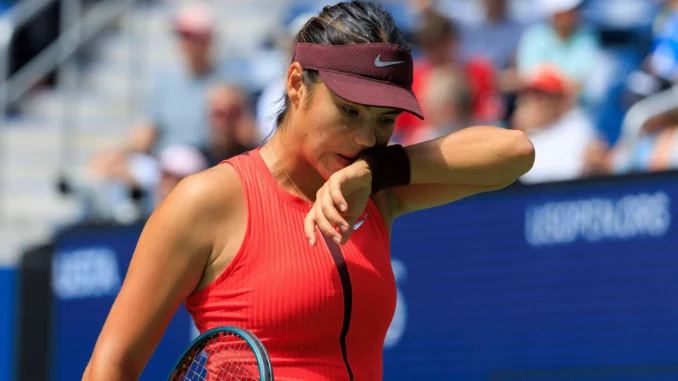
In the crucible of professional tennis, where physical prowess meets mental steel, Emma Raducanu continues to carve a narrative of grit and grace. The 22-year-old British star, whose improbable 2021 US Open triumph as a qualifier captivated the world, faced a harrowing setback at the Wuhan Open last week. Overwhelmed by searing 36-degree Celsius heat and oppressive humidity, she was forced to retire from her first-round match, a moment that saw her visibly drained and seeking medical aid. Yet, in a testament to her unyielding spirit, Raducanu has bounced back with renewed vigor, sharing an optimistic health update and setting her sights on a triumphant debut at the Ningbo Open. As she navigates the demanding Asian swing, her story is one of resilience, a beacon for fans who see in her a champion undeterred by adversity.
The Wuhan ordeal unfolded under conditions that pushed players to their limits. Facing American Ann Li in the opening round, Raducanu showed early promise, breaking serve to claim the first game. But the punishing climate—temperatures hovering near 36 degrees with humidity close to 70%—turned the court into a suffocating arena. Her energy waned, and after dropping the first set 6-1, she found herself trailing 4-1 in the second. During a changeover, she slumped in her chair, her face etched with exhaustion, prompting a medical timeout to check her blood pressure and vitals. Dizziness and fatigue proved insurmountable, forcing her to withdraw after just 58 minutes. It was a crushing blow for a player who had arrived with high hopes, but Raducanu soon offered reassurance via social media, posting from a Wuhan hospital bed: “Last day at the doctors in Wuhan. Feeling better now. Shame I couldn’t continue there, but thank you for the messages ❤️.” The update, paired with her trademark bandaged heart emoji, signaled a swift recovery and an unwavering resolve to move forward.
The Asian swing has been a rollercoaster for Raducanu, blending flashes of brilliance with gut-wrenching near-misses. In Seoul at the Korea Open, she powered past Jaqueline Cristian in straight sets, only to falter against Barbora Krejcikova, squandering three match points in a grueling 7-6, 4-6, 7-6 defeat. Beijing’s China Open followed a similar arc: a commanding 6-3, 7-6 victory over Jessica Pegula gave way to another three-match-point heartbreak against Daria Kasatkina in three sets. These battles against top-10 foes showcased her lethal serve—often winning 80% of first-serve points—and ferocious groundstrokes, yet underscored the fine margins that define her post-US Open journey. “I just need to push harder,” she reflected candidly. “It’s been a tough few weeks, but I want to get some more wins and keep building towards next year.” Her 2-3 record in Asia belies her progress, having climbed to No. 29 in the live WTA rankings—a remarkable rebound from injury-plagued seasons that once kept her off the tour.
Wuhan’s brutal conditions were a stark reminder of tennis’ physical toll, a sentiment echoed across the circuit. Novak Djokovic, who battled nausea in Shanghai, called the Asian swing “brutal,” while Jannik Sinner grappled with cramps. Raducanu herself noted the unique challenge of the season’s end: “I think where it’s different is just, it’s at the end of the season, so you need to push harder physically, you’re feeling it a bit more, and mentally as well, to just focus. That’s probably the biggest difference.” Her withdrawal wasn’t isolated—Jelena Ostapenko also retired in Wuhan, citing heat stroke, amplifying calls for better heat protocols in the sport. Yet, for Raducanu, these trials are fuel, forging a resilience honed through ankle surgeries and the weight of global expectations.
The Ningbo Open, a WTA 500 event, offers a fresh canvas. As a wildcard, Raducanu faces local favorite Lin Zhu in the first round, a match charged with home-crowd energy. A win could pit her against top seed Mirra Andreeva, last year’s runner-up, with heavyweights like Ekaterina Alexandrova or Liudmila Samsonova potentially awaiting. Success here could cement her seeding for the 2026 Australian Open, sparing her early clashes with titans like Iga Swiatek or Aryna Sabalenka, who’ve haunted her recent Grand Slams. Her 2025 season—28 wins in 48 matches—reflects a player reborn, blending flashes of her US Open magic with hard-earned maturity. Upcoming stops in Tokyo for the Toray Pan Pacific Open and the Hong Kong Tennis Open beckon as chances to bolster her points tally.
Adding a personal layer to her campaign is her mother, Renee, whose Chinese heritage makes these tournaments a homecoming. Raducanu, fluent in Mandarin, has been embraced by local fans, their fervor a throwback to her 2021 glory. “I think it’s a special feeling. I feel very comfortable, I feel like I get amazing support here, which is so nice. I love how invested the Chinese fans are and how much support they give,” she shared, her voice warm with gratitude. This connection has buoyed her, a reminder of the global stage she commands.
Raducanu’s journey is a tapestry of triumphs and trials. From a teenage qualifier’s Grand Slam heroics to battling injuries and form dips, she’s grown into a figure of quiet strength. Wuhan’s heat wasn’t just a physical hurdle—it mirrored the broader pressures of elite sport, where every setback tests the soul. As she steps onto Ningbo’s courts, backed by fans and fueled by a vow to “push harder,” Raducanu embodies hope. Her story, far from its final chapter, captivates for its raw humanity—the falls, the fightbacks, and the belief that glory lies just beyond the next rally. With 2026’s majors on the horizon, this isn’t the end, but a bold new beginning. Fans, brace yourselves: Emma’s ready to reignite the spark.
Leave a Reply